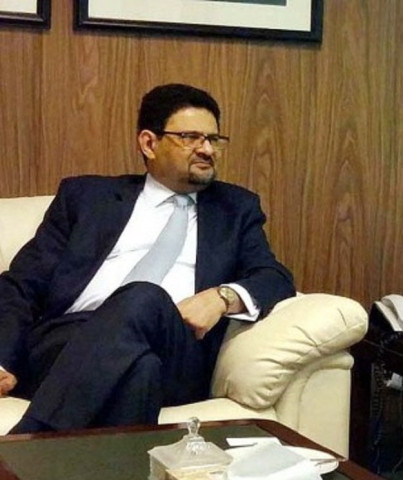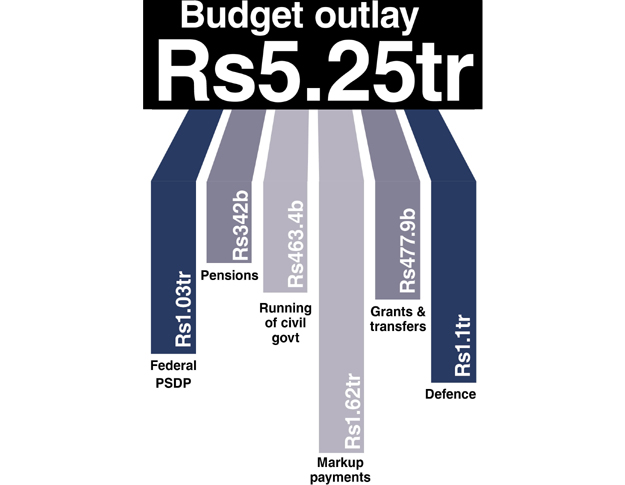A candy-coated budget by Miftah
Taxation measures outweigh relief offered to industrialists, agriculturists and salaried

PHOTO: APP
The key reason behind 10% increase was that Dr Ismail tried to present relatively realistic picture of expenditures, unlike his predecessor Ishaq Dar who always understated expenditures at time of budget.
There is a Rs1.9 trillion hole in the budget, which is equal to 4.9% of Gross Domestic Product (GDP) and will be filled by taking foreign and domestic loans.
Pakistan posts 5.8% growth rate
A closer look at the budget documents, including the Finance Bill 2018, reveals that contrary to what most people expected, the newly appointed Finance Minister Dr Miftah Ismail has not lost sight of the economic realities while presenting his first and incumbent outgoing regime’s sixth budget.
Because of this reason, the government took measures, which would generate revenues that will be higher than the losses due to tax breaks. The government also announced only 10% raise in the salaries of the employees, which is also normal.
The government also backtracked from its earlier announcement of increasing income tax exemption threshold from Rs400,000 to Rs1.2 million. It levied very nominal tax of Rs1,000 to Rs2,000 per annum on people earning from Rs400,000 to Rs1.2 million.
The budget for fiscal year 2018-19 is quite unusual in all aspects. It is for the first time that a government that was elected for five years gave six budgets, which the Leader of the Opposition in the National Assembly Khursheed Shah called an attempt to ‘usurp the right of the next parliament’.
Budget 2018-19: Historic high of Rs1.03tr allocated for PSDP
It was for the first time that an unelected finance minister presented the budget in the National Assembly, causing uproar. Scuffle also broke out between the Pakistan Tehreek-e-Insaf’s (PTI) Murad Saeed and the PML-N’s Abid Sher Ali.
The members of the opposition parties gathered in front of Dr Miftah Ismail’s podium and tore apart the budget documents. Due to noise made by the opposition parties, the minister’s speech was inaudible.
Ismail was sworn in as the country’s finance minister earlier on Friday.
“It is an insult of the parliament that an unelected person is presenting the budget,” said Khursheed Shah. He went on to say that Dr Miftah’s speech was actually a defeat of former prime minister Nawaz Sharif’s narrative of giving respect to the vote, as the minister was not an elected member.
Opposition political parties have called the move ‘illegal and unconstitutional’, but Ismail remained adamant that fiscal operations need to be announced for the entire year.

Election budget?
It was expected that the PML-N government would announce a people-friendly budget due to upcoming general elections. However, where the government gave tax relief to industrialists, agriculturalists, stock brokers and salaried persons, it also levied new taxes or increased the rates to recover the losses.
The government has proposed to increase the petroleum levy rates by three fold to Rs30 per litre on all petroleum products including kerosene oil and liquefied petroleum gas. The estimated revenue from this single measure is Rs300 billion for fiscal year 2018-19.
The Federal Board of Revenue (FBR) chairman said the government would sustain Rs184.5 billion gross losses due to income tax, sales tax and customs duties reliefs. In order to compensate these losses, the government also levied minimum Rs93.3 billion new taxes. The cumulative impact of Petroleum Levy and new additional taxes is far higher than Rs184.5 billion relief measures.
In addition to increasing petroleum levy rates, the government also took some inflationary tax measures. The most regressive measure is the FBR’s decision to increase 1% additional custom duty on almost all imported items except those that come on concessionary rates under the bilateral free trade agreements. It is already charging 1% additional custom duty on all the four slabs.
The 1% additional duty will be applicable on 7,200 imported tariff lines, said the FBR Member Customs Zahid Khokar. The government will earn extra revenue of Rs28 billion from this single measure.
The other most regressive taxation measure is the increase in further sales tax rate from 2% to 3%, which will generate Rs12 billion in additional revenues. The further tax is charged from those who are not registered sales tax persons and there are less than 150,000 registered sales tax persons. The decision will effectively increase the standard 17% General Sales Tax Rate to 20%, which is inflationary.
The government has also increased the tax rates on cement by Rs0.25 to Rs1.5 per kg aimed at getting additional revenue of Rs11 billion, said the FBR Member Inland Revenue Policy Dr Mohammad Iqbal.
Relief measures
Dr Ismail announced to accept most of the demands put forth by the industrialists and stock market brokers. He announced to abolish 5% bonus tax share, reduced the corporate tax rate by 1% and super tax rate by 1% and lowered the taxes on undistributed profits.
The income tax rates for mutual funds and REITs are also cut to appease Karachi-based industrialists. For Punjab-based agriculturists lobby, the sales tax rates on fertilizers and agriculture machinery are lowered.
The federal cabinet has approved an expansionary fiscal policy that offers little for development but gives away more than half of the estimated budget of Rs5.237 trillion for new fiscal year to meet growing needs of the defense and debt servicing. It announced to continue textile export package, Greenfield investment package and revival of sick industries package for the next fiscal year.
Budget outlay
Miftah Ismail announced that the size of the budget will be Rs5.246 trillion – higher by Rs493 billion or 10.3%. About 54% of the budget has been proposed to allocate for defense and debt servicing.
The current expenditures are estimated at Rs4.2 trillion for the new fiscal year. The development budget is Rs800 billion and Rs180 billion are allocated for other development expenditures.
Another amount of Rs1.620 trillion or 31% of the proposed budget has been earmarked for the debt serving. The original debt servicing cost in the outgoing fiscal year was Rs1.364 trillion, which has now jacked by Rs243 billion or 17.8% for the next year.
Ismail proposed Rs800 billion for the Public Sector Development Programme (PSDP), which is Rs230 billion less than the Planning Ministry printed in its document of the PSDP for 2018-19.
For running the civilian government, the federal cabinet approved Rs463.4 billion for the next fiscal year as against Rs377 billion in the outgoing fiscal year.
Another main expense is on account of pension including military’s, as the government proposes Rs342 billion or 6.6% of the proposed budget under this head.
In the outgoing fiscal year, former finance minister Ishaq Dar had set aside Rs248 billion for pensions which the Finance Ministry has now upward revised to Rs320 billion.
For subsidies, the government has proposed Rs174.7 billion in the next budget, which is up from Rs144 billion revised budget for the outgoing year. For Benazir Income Support Programme Rs124 billion have been proposed.
The government has proposed the FBR’s tax collection target at Rs4.435 trillion, non-tax collection target at Rs772 billion. The four provinces will get Rs2.59 trillion as their share in the federal tax collection under the 7th National Finance Commission Award.



















COMMENTS
Comments are moderated and generally will be posted if they are on-topic and not abusive.
For more information, please see our Comments FAQ